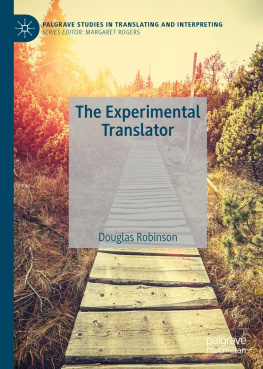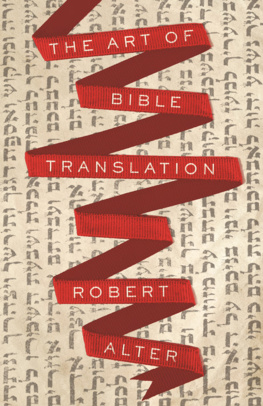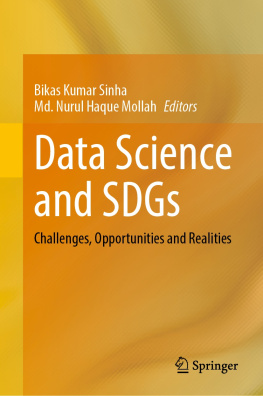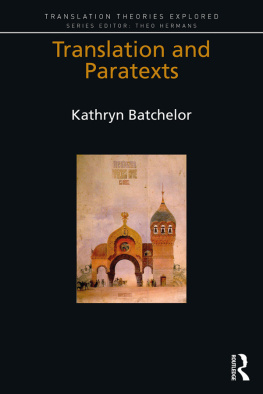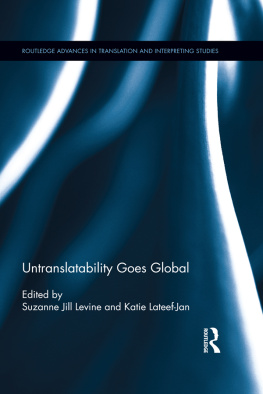Youdale - Using computers in the translation of literary style : challenges and opportunities
Here you can read online Youdale - Using computers in the translation of literary style : challenges and opportunities full text of the book (entire story) in english for free. Download pdf and epub, get meaning, cover and reviews about this ebook. year: 2020, publisher: Routledge, genre: Art. Description of the work, (preface) as well as reviews are available. Best literature library LitArk.com created for fans of good reading and offers a wide selection of genres:
Romance novel
Science fiction
Adventure
Detective
Science
History
Home and family
Prose
Art
Politics
Computer
Non-fiction
Religion
Business
Children
Humor
Choose a favorite category and find really read worthwhile books. Enjoy immersion in the world of imagination, feel the emotions of the characters or learn something new for yourself, make an fascinating discovery.

Using computers in the translation of literary style : challenges and opportunities: summary, description and annotation
We offer to read an annotation, description, summary or preface (depends on what the author of the book "Using computers in the translation of literary style : challenges and opportunities" wrote himself). If you haven't found the necessary information about the book — write in the comments, we will try to find it.
Youdale: author's other books
Who wrote Using computers in the translation of literary style : challenges and opportunities? Find out the surname, the name of the author of the book and a list of all author's works by series.
Using computers in the translation of literary style : challenges and opportunities — read online for free the complete book (whole text) full work
Below is the text of the book, divided by pages. System saving the place of the last page read, allows you to conveniently read the book "Using computers in the translation of literary style : challenges and opportunities" online for free, without having to search again every time where you left off. Put a bookmark, and you can go to the page where you finished reading at any time.
Font size:
Interval:
Bookmark:
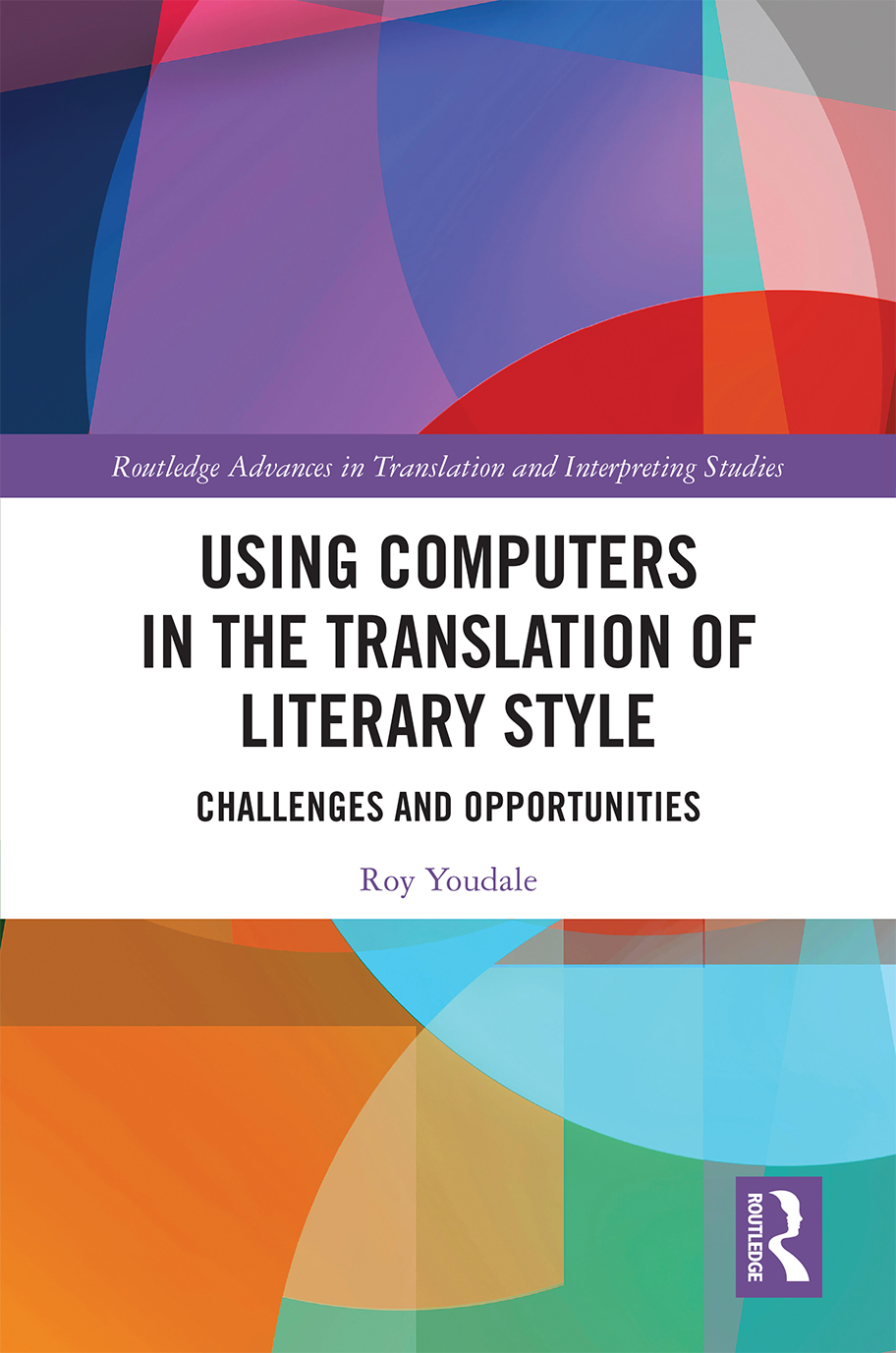
This volume argues for an innovative interdisciplinary approach to the analysis and translation of literary style, based on a mutually supportive combination of traditional close reading and distant reading, involving corpus-linguistic analysis and text-visualisation. The book contextualises this approach within the broader story of the development of computer-assisted translation including machine translation and the use of CAT tools and elucidates the ways in which the approach can lead to better informed translations than those based on close reading alone. This study represents the first systematic attempt to use corpus linguistics and text-visualisation in the process of translating individual literary texts, as opposed to comparing and analysing already published originals and their translations. Using the case study of his translation into English of Uruguayan author Mario Benedettis 1965 novel Gracas por el Fuego, Youdale showcases how a close and distant reading (CDR) approach enhances the translators ability to detect and measure a variety of stylistic features, ranging from sentence length and structure to lexical richness and repetition, both in the source text and in their own draft translation, thus assisting them with the task of revision. The book reflects on the benefits and limitations of a CDR approach, its scalability and broader applicability in translation studies and related disciplines, making this key reading for translators, postgraduate students and scholars in the fields of literary translation, corpus linguistics, corpus stylistics and narratology.
Roy Youdale teaches undergraduate translation at Bristol University, UK, where he completed his PhD in 2017. He is researching the use of corpus linguistics and text-visualisation in literary translation and has presented his work at the universities of East Anglia and Swansea, and the Link Campus University in Rome.
35 Perspectives on Retranslation
Ideology, Paratexts, Methods
Edited by zlem Berk Albachten and ehnaz Tahir Gralar
36 A (Bio)Semiotic Theory of Translation
The Emergence of Social-Cultural Reality
Kobus Marais
37 A Sociological Approach to Poetry Translation
Modern European Poet-Translators
Jacob S. D. Blakesley
38 Complexity Thinking in Translation Studies
Methodological Considerations
Edited by Kobus Marais and Reine Meylaerts
39 Translating and Interpreting in Korean Contexts
Engaging with Asian and Western Others
Edited Ji-Hae Kang and Judy Wakabayashi
40 Hybrid Englishes and the Challenges of/for Translation
Identity, Mobility and Language Change
Edited by Karen Bennett and Rita Queiroz de Barros
41 Translating the Visual
A Multimodal Perspective
Rachel Weissbrod and Ayelet Kohn
42 Using Computers in the Translation of Literary Style
Challenges and Opportunities
Roy Youdale
For more information about this series, please visit https://www.routledge.com/Routledge-Advances-in-Translation-and-Interpreting-Studies/book-series/RTS
Challenges and Opportunities
Roy Youdale

First published 2020
by Routledge
52 Vanderbilt Avenue, New York, NY 10017
and by Routledge
2 Park Square, Milton Park, Abingdon, Oxon, OX14 4RN
Routledge is an imprint of the Taylor & Francis Group, an informa business
2020 Taylor & Francis
The right of Roy Youdale to be identified as author of this work has been asserted by him in accordance with sections 77 and 78 of the Copyright, Designs and Patents Act 1988.
All rights reserved. No part of this book may be reprinted or reproduced or utilised in any form or by any electronic, mechanical, or other means, now known or hereafter invented, including photocopying and recording, or in any information storage or retrieval system, without permission in writing from the publishers.
Trademark notice: Product or corporate names may be trademarks or registered trademarks, and are used only for identification and explanation without intent to infringe.
Library of Congress Cataloging-in-Publication Data
A catalog record for this title has been requested
ISBN: 978-0-367-14123-3 (hbk)
ISBN: 978-0-429-03034-5 (ebk)
Typeset in Sabon
by codeMantra
To my partner Graciela and my father Bill, for their unstinting love and support throughout this project
I would like to thank various copyright holders for their permission to include different kinds of material in this book: Guillermo Schavelzon and the Schavelzon Graham Agencia Literaria, S.L., for extracts from Gracias por el Fuego by Mario Benedetti; Professor Jan Christoph Meister and his team at the University of Hamburg for screenshots of the CATMA website; Michal Cukr and the Sketch Engine team for screenshots of the Sketch Engine website; Kostiantyn Kucher and Andreas Kerren at Linnaeus University in Sweden for screenshots of the TextVis Browser website; and Professor Stfan Sinclair and Dr. Geoffrey Rockwell at the University of Alberta for screenshots of the Voyant Tools website.
A number of senior academics have gone out of their way to help and support me in the process of proposing and then writing this book, and I want them to know how grateful I am. Dr. Carol OSullivan, Director of Translation at the University of Bristol, first suggested the idea for the book after steering me patiently through my PhD. Jean Boase-Beier, Professor Emerita of Translation at the University of East Anglia, guided me through the proposal process and read parts of the draft, providing helpful comments. Andrew Rothwell, Professor of French and Translation at Swansea University, and Tom Cheesman, Professor of German also at Swansea University have been more than generous with their time in reading and commenting on parts of the draft manuscript, and also in inviting me to participate in workshops and an international summer school on the theme of the use of computers in literary translation, which have allowed me to present this research to a wider audience.
I would also like to thank staff at Routledge Elysse Preposi, Editor in Linguistics, and Alexandra Simmons, Editorial Assistant for their help and patience in answering all my questions and guiding me through the process of publishing an academic monograph. The author, however, retains full responsibility for all errors and omissions.
BNCBritish National CorpusCALTcomputer-assisted literary translationCATcomputer-aided translationCATMAComputer-Aided Textual Markup and AnalysisCDRclose and distant readingCLcorpus linguisticsCQLcorpus query languageCTScorpus-based translation studiesDTSDescriptive Translation StudiesETNEmerging Translators NetworkMTmachine translationNMTneural machine translationPOSpart of speechSLsource languageSMTstatistical machine translationSTsource textTAUSTranslation Automation Users SocietyTLtarget languageTMXTranslation Memory eXchangeTSTranslation StudiesTTtarget textTTRtype-token ratioFont size:
Interval:
Bookmark:
Similar books «Using computers in the translation of literary style : challenges and opportunities»
Look at similar books to Using computers in the translation of literary style : challenges and opportunities. We have selected literature similar in name and meaning in the hope of providing readers with more options to find new, interesting, not yet read works.
Discussion, reviews of the book Using computers in the translation of literary style : challenges and opportunities and just readers' own opinions. Leave your comments, write what you think about the work, its meaning or the main characters. Specify what exactly you liked and what you didn't like, and why you think so.

